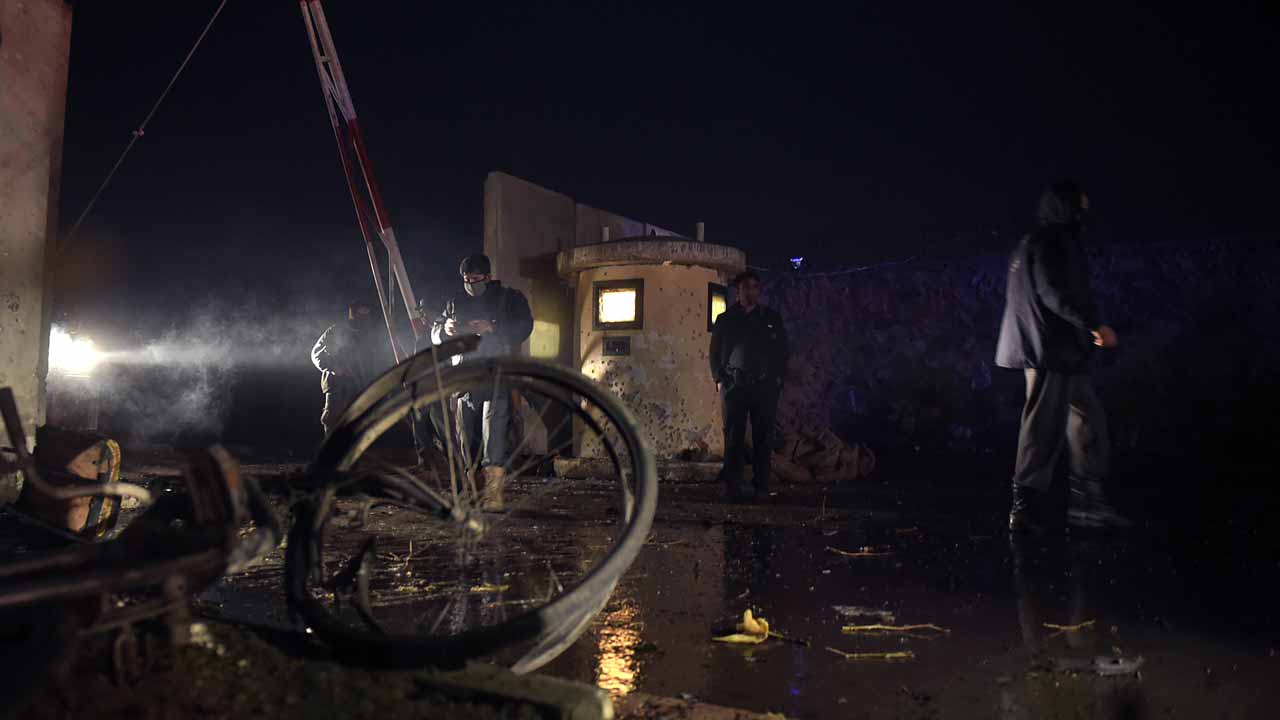
Twin Taliban blasts struck near the Afghan parliament in Kabul January 10, killing at least 30 people and wounding 80 in a rush-hour attack that shattered a relative lull in violence in the capital. The bombings came just hours after a Taliban suicide bomber killed seven people in Lashkar Gah, the capital of the volatile southern province of Helmand, as the militants ramp up attacks. WAKIL KOHSAR / AFP
Bombings across three Afghan cities including Kabul killed around 50 people Tuesday, in a day of carnage that shattered a relative lull in violence as Taliban insurgents escalate a deadly winter campaign.
At least nine people died when explosives hidden in a sofa detonated inside the governor’s compound in southern Kandahar during a visit by the UAE ambassador to Afghanistan, who escaped the attack with injuries.
Just hours earlier, twin Taliban blasts in Kabul tore through employees exiting a parliament annexe, which houses the offices of lawmakers, killing at least 30 people and wounding 80 others.
And earlier Tuesday, a Taliban suicide bomber killed seven people in Lashkar Gah, the capital of volatile Helmand province, as the militants ramp up nationwide attacks despite the onset of winter, when fighting usually wanes.
The carnage underscores growing insecurity in Afghanistan, where US-backed forces are struggling to combat a resilient Taliban insurgency as well as Al-Qaeda and Islamic State militants.
Kandahar’s governor and UAE envoy Juma Mohammed Abdullah Al Kaabi were wounded by flames from the explosion, but many others were burned beyond recognition, provincial police chief Abdul Raziq told AFP.
He said around a dozen people were killed in the bombing, but local Tolo News gave a death toll of nine. No militant group has so far claimed responsibility.
But the Taliban said they were behind the Kabul blasts.
In the first explosion, a suicide bomber blew himself up next to a minibus transporting government employees. As rescuers reached the scene, a car bomb exploded.
Among the 30 dead were four policemen who were killed in the second explosion when they rushed to help the victims of the first blast.
Health ministry spokesman Waheed Majroh warned that the toll was expected to rise as many of the wounded were battling for their lives in hospital.
Taliban spokesman Zabihullah Mujahid said they were behind the twin blasts, adding the victims were mostly Afghan intelligence agents. The insurgents are known to exaggerate battlefield claims.
– ‘Gruesome campaign’ –
“The deaths of scores of civilians in today’s Kabul bomb attacks indicates that the Taliban are pressing ahead with a gruesome campaign of violence that makes no effort to spare civilian lives,” Amnesty International said in a statement.
“An immediate, impartial and independent investigation must be carried out to secure justice for the victims and their families.”
Tuesday’s carnage comes just two weeks before Donald Trump is sworn in as US president.
The situation in Afghanistan will be an urgent matter for the new leader, even though America’s longest war got scarcely a passing mention in the bitterly contested presidential election.
President-elect Trump has given few details on his expected foreign policy, with even fewer specifics on how he will tackle the war in Afghanistan.
Repeated bids to launch peace negotiations with the Taliban have failed and a fierce new fighting season is expected to kick off in the spring.
Afghanistan last week welcomed the Pentagon’s decision to deploy some 300 US Marines to Helmand, where American forces engaged in heated combat until their mission ended in 2014.
The Marines will head to the poppy-growing province this spring to assist a NATO-led mission to train Afghan forces, in the latest sign that foreign forces are increasingly being drawn back into the worsening conflict.



